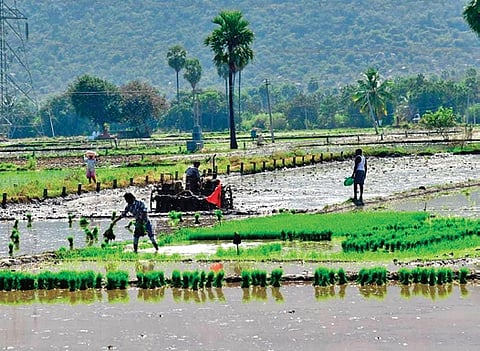

NALGONDA: With the government procurement of paddy underway, farmers highlight a new kind of issue. Despite toiling relentlessly to grow and harvest the crops, the tillers say they are being exploited — sometimes by the transporters, the staff at purchase centres or even the millers.
Though the process is extremely arduous, it is critical for paddy farmers, who put in their sweat, blood and almost their entire life savings apart from borrowed money to cultivate one batch, sources said. At this time, the wastage of grains can affect their livelihood and even drive some to attempt suicide.
At Indira Kranthi Patham (IKP) centres, for instance, one kilogram of paddy per 40-kg bag is deemed waste, resulting in direct losses for farmers, the sources added. Additionally, hamalis (labourers) take 20 kg of paddy for every six quintals as payment for their services, and lorry drivers charge `2 per bag. Farmers are forced to oversee every step, from weighing their produce to ensuring its delivery at the mills, even though the government provides free transportation facilities.
In Suryapet district, coarse rice is cultivated on 99,329 acres, yielding 11,45,093 metric tonnes, while superfine rice is grown on 3,82,375 acres, with an estimated yield of 9,92,011 metric tonnes. To facilitate procurement, 181 centres have been set up for coarse rice and 130 for the superfine variety. However, the farmers selling coarse rice at IKP centres bear the burden of ensuring their paddy reaches the mill and is accepted.
Numerous incidents highlight the plight of farmers. For instance, in Tungathurthi mandal, a farmer, Keema Naik, from Annaram village, recently faced rejection of his paddy four days after delivering it to a rice mill in Kodad. The millers insisted on deducting seven kilograms per 40-kg bag as waste, causing Naik and his wife, Punnamma, to attempt suicide by dousing petrol on themselves in desperation. Following this, officials intervened and ordered the mill to accept the returned grain.
While officials have repeatedly warned millers against such practices, a lack of oversight and rampant corruption at various levels allow these exploitative practices to persist unchecked, the sources said.